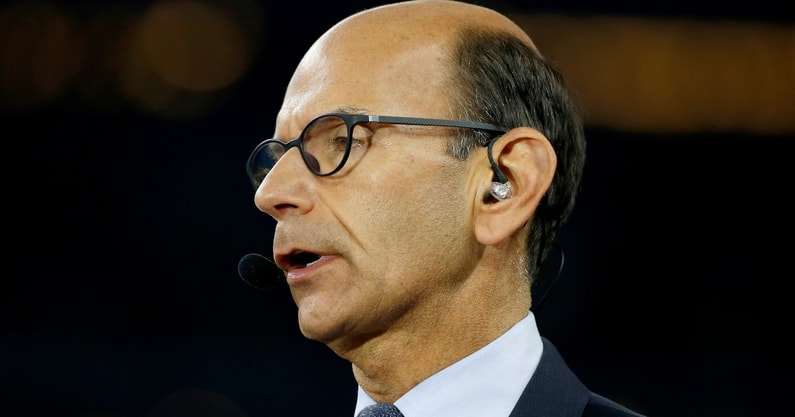Paul Finebaum reveals how much stock he puts into spring games

Paul Finebaum has years of SEC coverage under his belt and the ESPN host and analyst has a strong opinion when it comes to putting stock in storylines coming out of spring games.
The SEC guru recently joined the McElroy and Cubelic show and Greg McElroy, fresh off a trip to the Auburn spring game over the weekend, wanted Finebaum’s take on putting stock into the offseason action in April.
“Almost none, Greg,” Finebaum responded. “And you are someone who knows more about them than I do, because I used to go to them a ton and I found myself saying, ‘why am I doing this?”
“You know, I don’t have to go like Cole and you guys,” the ESPN host continued. “Because you know coaches are using them for a specific purpose. What they are really built for, is it’s an exhibition and another reason to get everybody on campus and to remind them of why they should give money to whatever specific collective, whatever school you’re a fan of.”
Beyond early hype about new players or fans debating position battles, Finebaum is essentially labeling spring games as a marketing effort driven toward fans — and while coaches would likely argue there are benefits to the team playing in front of a crowd, in the stadium etc. — the ESPN analyst makes a valid point.
“But ultimately — other than the fan calling into your show and saying, ‘Hey, I saw that No. 37 for Auburn on Saturday and he’s going to be a Heisman candidate,’ they don’t mean very much at all.”
Top 10
- 1New
AP Poll Top 25
Top 25 shakeup before Jan. 1
- 2
CFP changes?
Guaranteed byes, seeding in question
- 3Hot
Leonard Hamilton sued
Six FSU players sue head coach
- 4
Isaiah Bond
Injury update emerges on Texas WR
- 5
Cam Ward
Sitting 2nd half sparks questions
Get the On3 Top 10 to your inbox every morning
By clicking "Subscribe to Newsletter", I agree to On3's Privacy Notice, Terms, and use of my personal information described therein.
Paul Finebaum reveals surprising detail about SEC decision to add Oklahoma, Texas
ESPN analyst and expert of all things SEC, Paul Finebaum, gave a surprising take on the conference’s acquisition of Texas and Oklahoma. On Saturday, during the Paul Finebaum Show, the analyst answered a guest caller’s question and explained in detail that perhaps the SEC didn’t want to take on the schools.
“I don’t think the SEC wanted to expand. The SEC was put in a position about a year ago and the commissioner received a call… that Texas and Oklahoma wanted to join. so let me throw this back at you [if] you’re the commissioner of the SEC you find out the two of the most valuable properties in the sport want to join your league — tell me how you handle it.”
Last year Texas and Oklahoma made waves throughout college sports after announcing that they plan to leave the Big 12 and join the SEC no later than 2025. The move came as a shock to many, given the current college sports landscape surrounding the Power-5 conference setup. And for the SEC, they might have had their hands tied behind their backs on this one, either accepting the two significant schools or witnessing a much more disastrous result for the conference.
“Here’s the answer, whether they wanted them or not, they were faced with this dilemma; if they said no, then a couple of things were going to happen. Either Texas and Oklahoma were going to join one of their competitors, either the Big Ten or the ACC; probably the Big Ten or they were going to form their own league and put everyone in college football and college athletics on notice. So the SEC, whether they really wanted them or not made a business decision. It’s as simple as that,” Paul Finebaum exclaimed.